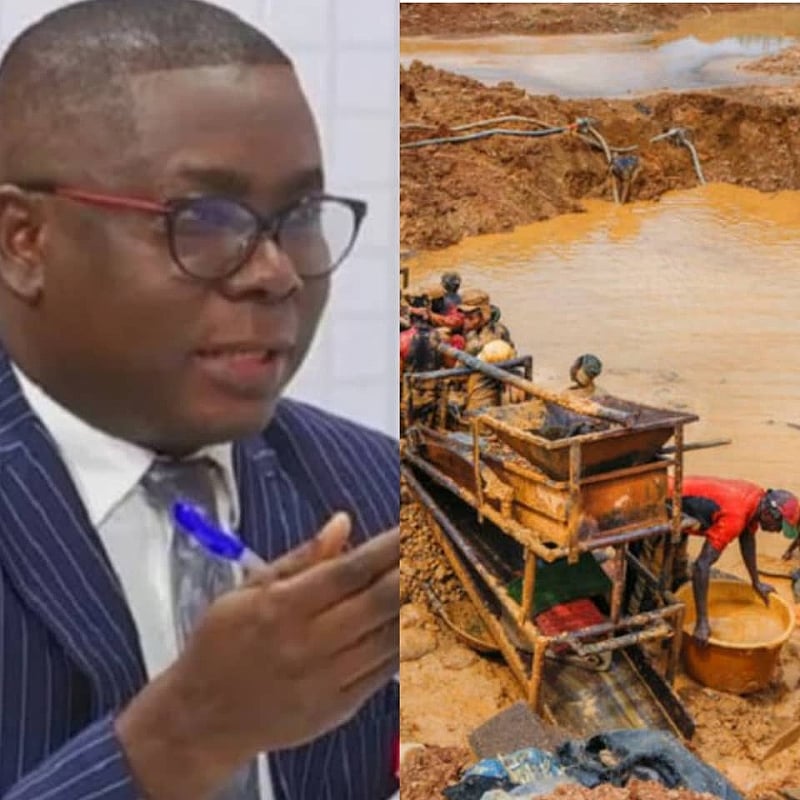Dr. Gideon Boako, spokesperson for the New Patriotic Party (NPP) flagbearer Dr. Mahamudu Bawumia and parliamentary candidate for Tano North, has made headlines with his stern condemnation of illegal mining activities, particularly those occurring along Ghana’s water bodies. During an appearance on the Kokrokoo morning show on Peace FM, Dr. Boako described these practices as “evil,” underscoring the pressing need for immediate action to address the widespread issue of illegal mining, often referred to as ‘galamsey.’ His remarks reflect a growing concern from various sectors of society over the detrimental environmental and social impacts of reckless mining practices in the country, particularly in waterlogged regions which are crucial to the ecosystem.
Proposing a concrete solution to combat the menace, Dr. Boako called for the government to consider re-instating a ban on all mining activities, specifically within water bodies and forest areas. His message was clear: “Mining in water bodies should be completely illegal, whether it’s done legally or illegally,” asserting that the protection of these vital natural resources is paramount. By mandating a total prohibition on such activities, he argues that the government would take a significant step towards preserving Ghana’s environment and safeguarding the health of its citizens. The implications of continuing mining operations in sensitive ecological zones are dire, and Dr. Boako believes that proactive measures must be taken to avert further degradation.
Moreover, Dr. Boako advocated for banning even licensed mining activities within forested areas, stressing that the potential harm to the environment could outweigh the economic benefits. His stance echoes a broader sentiment within Ghana, as the consequences of illegal mining have contributed to deforestation, pollution of water sources, and a loss of biodiversity. This proactive approach towards mining regulations is increasingly being echoed within public discourse, as citizens express their concerns regarding the environmental challenges posed by small-scale mining operations that often disregard the necessity of sustainable practices.
The issue of illegal mining, particularly galamsey, has rapidly escalated into a national crisis, garnering significant public attention and prompting widespread calls for government intervention. Increasing dissatisfaction with the perceived ineffectiveness of currently implemented regulations has led many Ghanaians to demand a more robust governmental response. Notably, some protesters have gone so far as to implore President Nana Addo Dankwa Akufo-Addo to declare a state of emergency to halt all small-scale mining practices until a comprehensive strategy can be established to manage the crisis appropriately. Public sentiment appears to be reaching a boiling point, igniting fervent discussions about how best to balance economic activities with environmental sustainability.
The recent arrest of over 50 demonstrators from the Democracy Hub, amid escalating tensions over illegal mining, highlights the growing public unrest regarding the government’s handling of the situation. This incident has drawn attention to the larger societal issues at play, as individuals seek to voice their frustrations regarding environmental degradation and the perceived failure of authorities to adequately enforce existing laws against mining in sensitive areas. The arrests underline not only the urgency of the situation but also the lengths to which citizens are willing to go to advocate for immediate action against environmental injustices.
As the discourse on illegal mining evolves, it becomes increasingly clear that comprehensive and sustainable solutions are necessary to address the myriad challenges posed by galamsey. Dr. Boako’s proposed solutions, including the reinstatement of a ban on mining activities around critical water bodies and forested areas, represent a starting point for discussions on how Ghana can effectively manage its natural resources while ensuring environmental protection. Ultimately, the way forward will require a coordinated effort between government authorities, community stakeholders, and civil society to foster a safe and sustainable approach to resource management that prioritizes both economic development and environmental stewardship.














